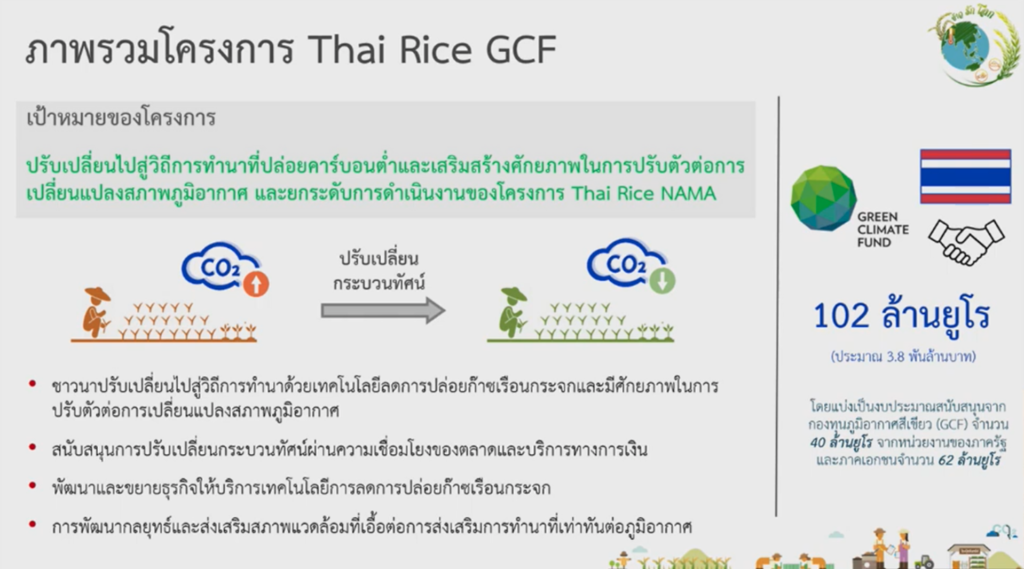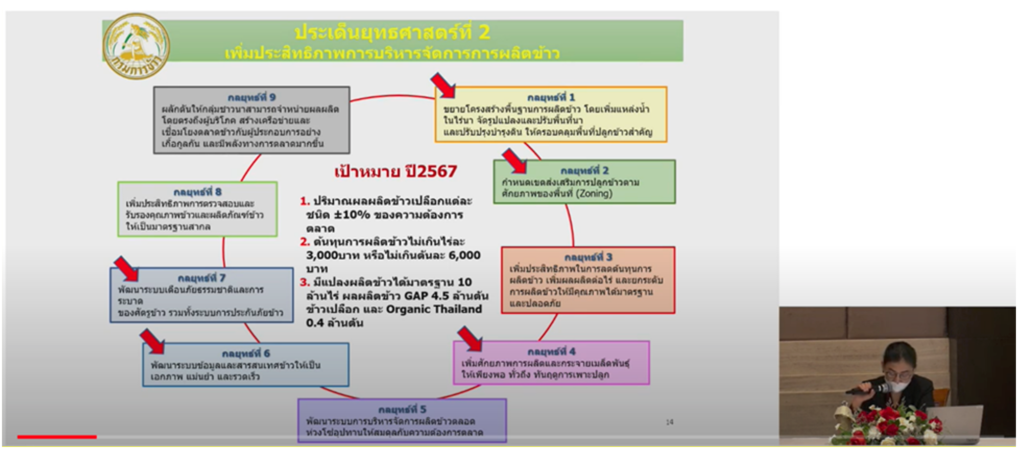GIZ and Thai stakeholders are racing to develop a full proposal for the 1.4 billion-baht Green Climate Fund
Dozens of agricultural practitioners and academics met to discuss feasibilities to develop mechanism and practice that will transform Thailand’s rice farming sector towards sustainable and environmentally friendly rice cultivation.
Led by the Deutsche Gesellschaft für Internationale Zusammenarbeit (GIZ) GmbH, a recent stakeholder consultation workshop aimed to seek inputs and recommendations on feasibilities to design mechanism and implementation for climate smart agriculture and climate smart technologies from the governmental sector, academic and related parties. The technical-oriented session was held after a series of consultation workshops on financial mechanism and recommendations and a meeting with the permanent secretary and executives at Ministry of Agriculture and Agricultural Cooperatives in mid-June.
Rice is an important crop for Thailand’s economy, society and culture. As one of the world’s top rice exporters, Thai rice sector undeniably contributes much to food security not only at the national but also global levels.

In 2018, the NAMA Facility approved funding for Thailand to implement The Thai Rice Nationally Appropriate Mitigation Actions known as “Thai Rice NAMA” project, which the Rice Department is the main implementing partner, together with other departments under the Ministry of Agriculture and Cooperatives. In addition, Bank for Agriculture and Agricultural Cooperatives (BAAC) is assigned to manage the five-year fund, totalling 8.4 million euros in order to encourage farmers and entrepreneurs to put in practice the so-called 4+1 climate-friendly technologies including Laser Land Leveling (LLL). Alternate Wetting and Drying (AWD), Site Specific Nutrient Management (SSNM), and Straw, Stubble Management (SSM), and + 1 Integrated Pest Management (IPM). The project aims to reduce greenhouse gas emissions from rice cultivation approximately 1.6 million tons of carbon dioxide equivalent by a completion of the project in July 2023.

To extend the project beyond July 2023, GIZ previously worked with The Office of Natural Resources and Environmental Policy and Planning and BAAC to draft and submit the Green Climate Fund (GCF) a concept note “Thai Rice: Strengthening Climate-Smart Rice Farming”, hereafter “Thai Rice GCF”. The concept note was already approved in December 2021. Brainstorming sessions with all related stakeholders in Thailand are carried out as a next step. A full proposal with a contribution of approximately 40 million euros (about 1.4 billion baht) is scheduled to be submitted to the GCF commissioner by Year 2022-end.
As many as 250,000 farmers in 15 provinces in the North, the Northeast and Central Plains will be benefited from the proposed Thai GCF project, which will be expected to mitigate up to 4 million tonnes of greenhouse gas emission through implementation of climate smart agriculture and technologies by 2028.

“The impact of climate change has become real and tangible around the world especially in Thailand listed among the top 10 countries facing climate risk. Increasing weather extreme, more frequent severe drought and flooding, farmers will experience such impact first hands. Undeniably, agricultural sector is the second biggest GHG carbon emission after energy.
With assistance from GIZ, we have shown that farmers can reduce GHG emission by 70% while increasing income through the application of climate-smart technology. We have the technologies. We know they work. We don’t have to invent anything new. We just need to disseminate these technologies to farmers in order to reduce emissions and create a more sustainable rice sector,” said Ole Henriksen Thai Rice NAMA project director during the opening of the workshop.

Orratai Jaituy, representative from the Department of Rice, said the proposed Thai GCF project aimed to leverage funding from the green climate fund to strengthen capacity building and financial development. It will contribute to the existing Thai policies on Bio Circular Green Economy (BCG), the National Adaptation Plan, and climate adaptation and water management in agriculture. It will also be able to contribute highly to the PM commitment during COP26 to carbon neutrality by 2050 and net zero by 2065.
“This workshop is very crucial. Inputs from all stakeholders will lead Thailand towards sustainable development goals and COP26 commitment,” she said.
As Thai farmers still had challenges of The planned GCF proposal is also relevant to the following three strategic plans on rice development in Thailand:
- Strengthening farmers and farmer groups to self-reliance, and sufficient livelihoods:At least 130,000 young smart farmers and 10,000 farmer groups are covered by the strategy by 2024.
- Enhancing effectiveness of rice production management: Increasing productivity of each rice grain type by 10%to meet market demand. Up to 10 million rai of rice plots meet standards. Up to 4.5 million tonnes of rice grain meet Good Agricultural Practice (GAP) standard and 0.4 million tonnes of rice products meet the Organic Thailand standard.
- Improving rice research and development, effectiveness and production technology: A total of 12 rice types have been developed by using technology and innovation. At least 10 innovative technologies, including precision rice farming by using drone, GIS, and censory equipment, agricultural machinery and climate-resilient rice production system, are available to reduce production cost while enhancing rice productivity.

Strengthening financial mechanism
Amphawa Synlanont, Thai Rice NAMA financial advisor, said the so-called “Thai Green Farmer Facility (TGFF)” will be introduced under the proposed Thai Rice GCF project, to ensure a continued implementation of climate smart practices in rice farming. The Facility will be created and operated in a bid to bridge all planned financial instruments including revolving fund, subsidy promotion scheme, credit for service providers, credit guarantee mechanism and insurances etc, for short, medium and long terms.

Participants heavily shared their lessons learned during group discussions during the workshop. Many believed rice farming demonstration plots are essential for farmers to access climate smart agriculture and climate smart technology in practice. Laser land levelling much implemented during the Thai Rice NAMA project can be taken as a lesson learned on offering a variety of incentives for rice smallholders to access technology and innovations. Carbon credits are an internationally recognised way for managing carbon emission in rice sector. A role of agrometeorology should come into play. Agricultural practitioners, rice farmers, service providers at governmental and private sectors should learn to utilise weather and climate information in order to boost production of not only rice but also other crops amid extreme weathers, diseases and other uncertain factors. ■











